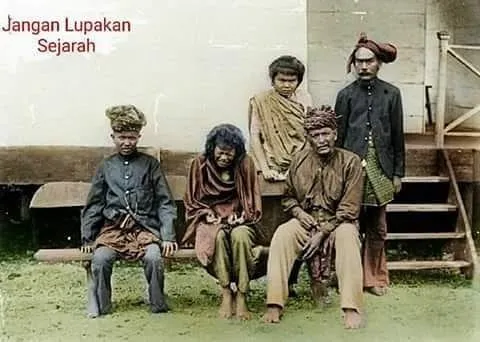The day was right on December 11, 1906 Sumedang Regent Arial Suriaatmaja prince came three guests. All three are prisoners from the Dutch East Indies government. An elderly woman is ugly, nearsighted and suffering from gout, a tall male buyer of about 50 years and a 5-year-old juvenile. Though looking tired, the three of them looked stoic. The shabby clothes she wore were the only clothes she could get aside from a beads and a rice pot from clay.
Later, seeing that the old lady was very religious, Arial prince did not put her in prison, but chose the place of a house of local religious leaders. To the prince of Suriaatmaja, the Dutch did not disclose who the elderly woman was. Even until his death, November 6, 1908 Sumedang people never know who the real woman.
A long journey has been taken by the woman before finally resting peacefully and buried in mountain Puyuh not far from downtown Sumedang. All they know, because of her poor health, she hardly ever leaves the house. His activities were limited to just zikr or teaching to study local mothers and children who came to visit. Occasionally they bring clothes or just food to the polite old woman, who later because of knowledge of his religious sciences called Ibu Perbu.
At that time no one thought if the woman they call Ibu Perbu is "The Queen of Aceh Battle" from Aceh war (1873-1904) named Tjoet Nyak Dhien. The lioness with a rencong in the hands that jumped directly into the battlefield. Uncompromising true hero who can not accept his area colonized. The last days of Tjoet Nyak Dhien are indeed decorated by silence and quiet. Far from the land of birth and loved ones. The beautiful and intelligent little girl called Cut Nyak was born to a devout noble family in Lampadang in 1848. Her father was Uleebalang named Teuku Nanta Setia, the descendant of Minang migrants from West Sumatera to Aceh around the 18th century when the sultanate of Aceh was ruled by Sultan Jamalul Badrul Munir.
Growing in an environment that holds tight religious traditions makes Cut Nyak Dhien's little girl an intelligent girl. Diusianya to 12 years he then married his parents with Teuku Ibrahim Lamnga son of Uleebalang Lamnga XIII.
The atmosphere of war that wrestled the atmosphere of Aceh broke out when April 1, 1873 F.N Niuwenhuyzen membluti war against the sultanate of Aceh. Since then wave after wave of Dutch invasion of Aceh has always been repeatedly repelled by the Aceh army, and Tjoet Nyak Dhien is certainly there. Among the slashes of rencong, the mighty war of war and the cannon boom, he also shouted the burning spirit of the people of Aceh when the Baiturrahman mosque fell and burned the Dutch army. "My people are all believers of the Acehnese! Look! Watch with your eyes Our mosque is burned !! Our worship place is destroyed !! They are opposed to God !! Remember that! Never forget and never forgive the Dutch kheir !! ". The Aceh resistance is not just in words (Szekely Lulofs, 1951-59). Aceh War is a story of courage, sacrifice, love of the homeland. So was Tjoet Nyak Dhien, with her father and her husband, every day at all times spent fighting and fighting against the Dutch kafirs. But the war also took one by one the loved ones, his father and her husband following the death in battle at Glee Tarom June 29, 1870. Two years later Tjoet Nyak Dhien received proposal Teuku Umar with consideration of war strategy. Later Teuku Umar also died in a sudden raid by the Dutch in Meulaboh, February 11, 1899.
But for Tjoet Nyak Dhien, the war against the Dutch was not only the property of Teuku Umar, or Teungku Ibrahim Lamnga her husband, nor was Teuku Nanta Setia's father monopoly, or Acehnese men. The Aceh War belongs to the people. At least that was what Tjoet Nyak Dhien pointed out, he continued to organize attacks against the Dutch.
Years later all the energy and thought of the noble Princess were only poured out into the war of expelling the invaders. Moving from one hiding place to another, from one forest to another, less food and lack of care keeps her health deteriorating. The condition of the troops was not much different. The force grew weaker until when the Dutch rushed to the hiding place of Tjoet Nyak Dhien and his troops were defeated. With age aged, nearsighted and sickly, Tjoet Nyak Dhien can not do much. Rencong was almost useless to defend himself. Iya Tjoet Nyak Dhien was caught and taken to Koetaradja (Banda Aceh) and dumped to Sumedang, West Java.
Tjoet Nyak Dhien's struggle inspired the astonishment of foreign historians to many books depicting the greatness of this Acehnese female warrior. Zentgraaft said the women were the de leidster Van het verzet (resistance leader) against the Dutch in the great war.
Aceh recognizes Grandes Dames (big women) who play an important role in various sectors, long before the western world talks about the equality of rights called women's emancipation.
Tjoet Nyak Dhien, "The Queen of Aceh Battle". the mighty lady, the real hero of a reality of her time, ended quietly in the country across.
Innalilahi wainnailaihi Raji'un.
